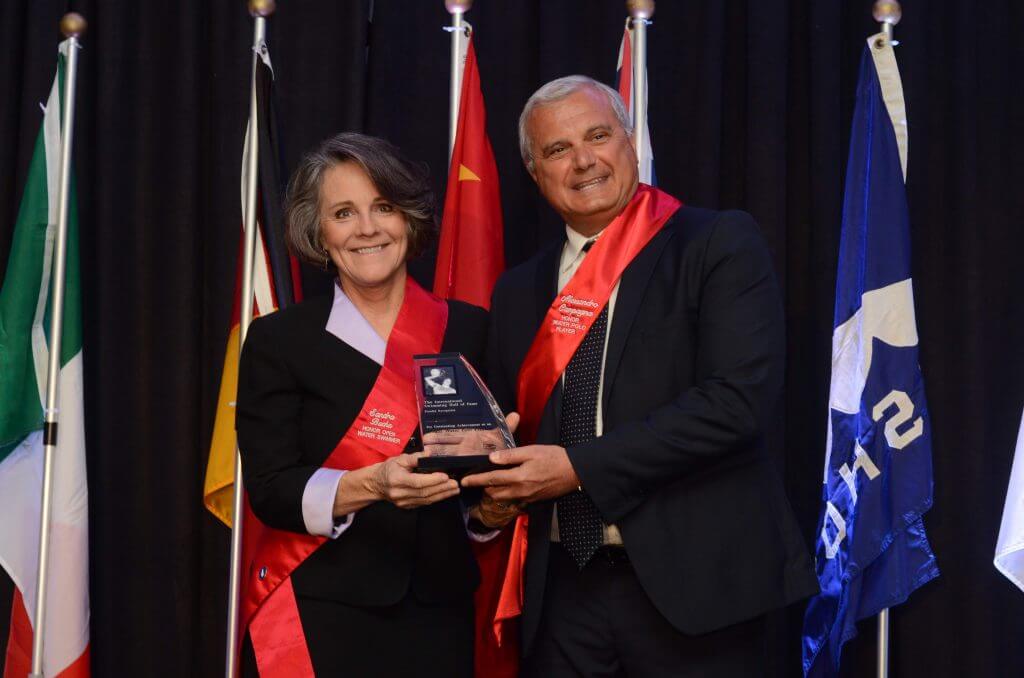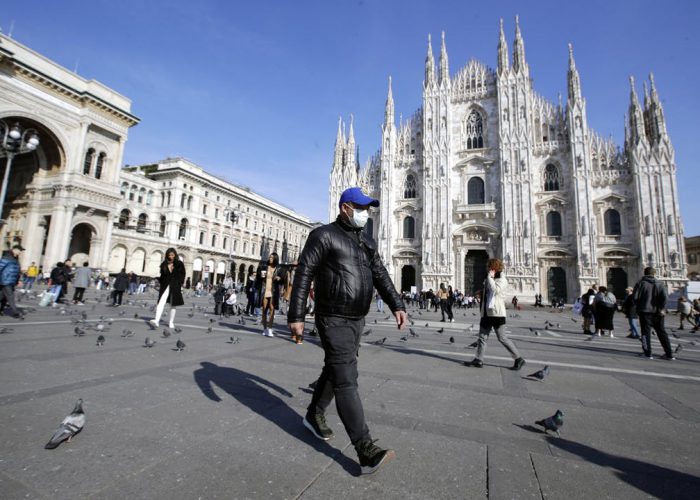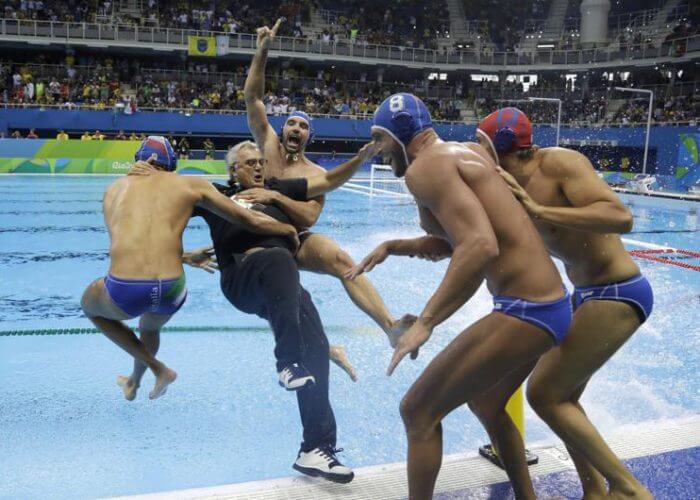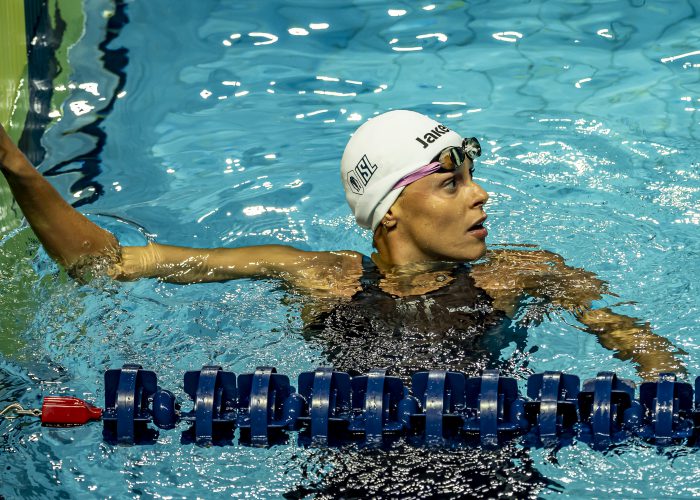Dispatches from Italy: Claudio Mangini Interviews Sandro Campagna, Italian Men’s Water Polo Coach

Editor’s Note: Given the devastation in Italy, Swimming World has taken particular interest in the circumstances surrounding aquatics sports in the country hit hardest by the coronavirus crisis.
The situation in Italy is heart-breaking. The numbers as a result of the coronavirus devastation are stark; more that 47,000 Italians infected with almost 4,000 deaths. That impact has been felt throughout the country, but a particular segment of Italian society—athletics—has been particularly hard hit. Water polo may be a minor sport throughout much of the world, but in Italy there’s high regard for the sport due to the success of the Settebello, the Italian national team.

Milan, Italy. Photo Courtesy: Luca Bruno
The current Italian head men’s coach is Alessandro “Sandro” Campagna, who has led the team for the past nine years after a previous stint as coach from 2001 – 03. Like all Italians, he is horrified by the impact of COVID-19 on his country, but is striving to maintain focus for the upcoming Tokyo Games, where Italy is a strong medal contender.
[World Renowned Water Polo Coach and Player, Alessandro Campagna, To Be Inducted Into ISHOF]
Following is an interview by Claudio Mangini, Italian swimming and water polo journalist, who this week spoke with Campagna about his daily routine in a time of crisis, how he keeps his players focused on training and whether or not now is a time for athletic competition, including the Olympics.
Translated from Italian and reproduced by permission of the author.
– What does the coach of an Olympic medalist do in coronavirus times?
I get up at 8 in the morning, shower, eat breakfast and open the windows—important in these times that you are closed in the house. When I close them, I use essential oils for the rooms. It is certainly not medical advice but common sense: it serves to thin the air.
Every two days I do the shopping and take it to my two children who are alone in this period because [their] mother is in Syracuse, close to her father. I go home, do four floors of stairs on foot because everything is needed and the real work begins. I have precise planning, hour by hour: it serves to keep the mind busy giving itself a method.
– What is your daily routine?
In the morning I study English, then I meet with the coaches; after lunch, I read books on scientific subjects, I watch video of a few games, I talk to the players via Skype or Whatsapp. We discuss the preparation they do at home with weights and tools: for someone working out in a gym is an opportunity for a targeted muscle training. And three days a week we all train together.
[Through] a connection on YouTube Monday, Wednesday and Friday at 5 pm. The athletic trainer Alessandro Amato, they, me and two thousand others, who thank me from all over Italy because they can train with Settebello.
It is an additional motivation for us and for the whole country.
– Let’s broaden the concept: in an emergency, without swimming pools available and without real training, would it be appropriate to give up?
Never. If I broke away, it would send a negative message to the whole team. A coach must lead by example. Our goal, until proven—or until a decision—is always the Tokyo Olympics.

Campagna and his player celebrate bronze win at the Rio Games in 2016.
It would be a huge mistake to step back. After all, this is a team used to pulling out all the energy in difficulty. Remember Rio? [Stefano] Tempesti’s retinal operation two months earlier, [Matteo] Aicardi’s troubles in preparation—and his nose fractured after a few seconds of the first game, the one with [Michael] Bodegas in the quarterfinals.
Yet, we won a bronze which is one of the most beautiful medals in the history of the Italian water polo team. In suffering, uncertainty and emergency, the push to give something more can come.
– Do you believe the Games will be played?
I expect a pronouncement from the WHO [World Health Organization]; [the] doctors will tell you what is the right thing to do. They will explain themselves with a scientific foundation—we cannot.
I understand the IOC: there are multibillion dollar interests at stake, which are very high. But everything must be done in the interest of the athlete and of the possibility that everything takes place in extreme safety.
– The day-to-day work continues, it is written in the IOC press release. Does a day-by-day approach make sense?
If football plans to reopen on May 3, it means that it believes athletes can gather for that date. Probably, I believe that the first deadline, from an Olympic perspective, may be in late April.
– Are your high-level opponents training?
I know that Croatia stopped yesterday, Hungary as well, I don’t know the situation in detail of all the other teams. Other [Italian] athletes have more luck than we do: Federica Pellegrini is training at the Federal Center of Verona, [Gabriele] Detti and [Gregorio] Paltrinieri in Ostia.

Federica Pellegrini. Photo Courtesy: Peter H. Bick
It would also be important for us to be able to work in the water, which is our element, not by playing because ours is a sport of contacts and struggle—at least by swimming—but today we are not in a position to do it. However, I don’t know if our Olympic antagonists are swimming in Los Angeles or Barcelona. I know that everyone has difficulties and, however, if the Olympics are held, you will never hear me one day say that others have had more chances than us to train.
– What should be done now?
I believe there is a priority for Italian sport: the 208 qualified athletes of each sport must be able to train. They, and those who still have to play the qualification. It will be three hundred a little more.
I’m not saying open doors and free everyone. It is a limited number, but these athletes—pending a final decision on the regular dispute or we of the Games—must have the opportunity to train. It is a request that must leave and be brought to the attention of Minister Vincenzo Spadafora.
– Football continued to play and there was a spread of the virus: where did we go wrong?
If the links are too wide, something escapes. It is from above that clarity was needed, and is needed.
– If you were in [Maurizio] Sarri’s shoes and had to choose between Champions and end of the championship?
I believe that the postponement of the European Championships should be interpreted as the desire, in all countries, to save the club season, nationally and internationally.



